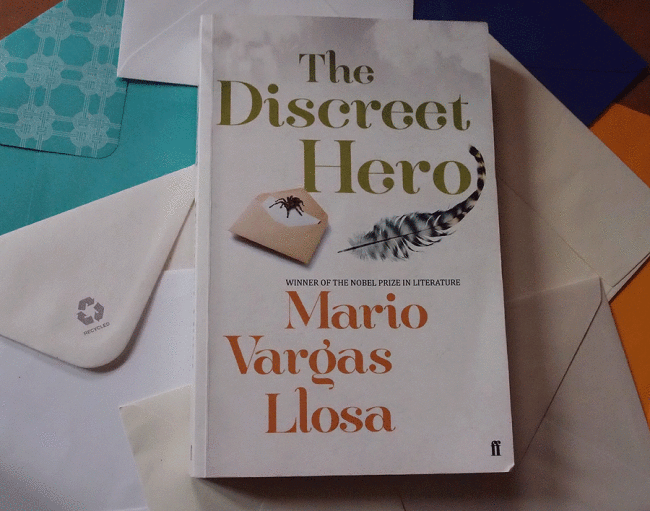by Mario Vargas Llosa
Published by Faber & Faber, 2015
Oh, where to start with this review? Perhaps with the author: Mario Vargas Llosa was born in Peru in 1936 and is one of the most significant Latin American writers of his generation. So significant, in fact, that in 2010 he was awarded the Nobel Prize in Literature. Now to the reader: I was born much later, on the other side of the world, and while I had a love affair with the magical realism of Latin American writers such as Gabriel Garcia Marques and Isabelle Allende in the 1990’s, I have never written a novel, and the Nobel Foundation will never, ever, ever, bestow a prize on me. I tell you this so that you can ignore all the critical things I am about to say, because, let’s face it, what would I know.
So, to the story: The Discreet Hero is set in modern day Peru and tells two tales that intersect late in the book. The first is of a self-made man who refuses to give in to extortionists – even in the face of arson and kidnap – because he lives by the advice of his poor, uneducated but very hardworking father, to ‘Never let anybody walk all over you’ – we are told this, over and over again, and Llosa’s habit of repeating what we already know is my first criticism (with all due respect, of course). The second narrative is of an old and wealthy patriarch who marries his house-keeper and thereby cheats his hateful sons, known to all as ‘The Hyenas’, of the inheritance they would most likely squander. When he flees on his honeymoon the fallout is felt most keenly by his trusted confidante, Don Rigoberto, a cultured Europhile given to sensual pleasure of all kinds and, most-likely, Mario Vargas Llosa’s alter-ego.
This book started well, and I quickly felt like I was reading a lightweight detective novel. It didn’t quite fit with the calibre of the author, but, between you and me, this came as a bit of a relief – it’s often hard work reading Nobel Prize winners. The expansive roll-call of characters and relationships reminded me of those other Latin American stories I have loved so much, and I was particularly intrigued by the very mysterious figure of Edilberto Torres. He pops up throughout the book, and the possibility he was the devil became reason enough to keep reading.
So I did. And I soon got to know who was who, and what was where, but the experience of slotting it all together was unsatisfactory, and the whole was no more than the sum of its parts, and perhaps, it was less.
What I did enjoy was Llosa’s evocation of place and its role in the mood of the story. There is also a dexterity in the way Llosa superimposes dialogue from two separate conversations to shed light on the past and the present simultaneously – once I realised what was going on, it was easy to keep up, and a pleasure to read. But these literary delights were not enough.
It may be that The Discreet Hero has suffered in its translation from Spanish to English. Or, it may be that the editor’s pen was stayed by the thought of deleting words written by a man of such literary renown. Or, it may be that I cannot appreciate Mario Vargas Llosa, because I have not read any of his previous stories. While this book stands alone, some of its characters have seen the page before. If I was familiar with them, I may have recognised and enjoyed the many references to their habits and previous adventures. But I wasn’t familiar, and as these references rarely had any bearing on what was going on in this story, they seemed only to confuse and clutter. How is this relevant? I found myself asking, again and again.
The one element that kept me reading when all else was tempting me to stop was the enigmatic Edilberto Torres. So what of him? Well, who knows? He and his literary potential were vaporised in a dull and saccharin ending that made me wish I’d read an Agatha Christie novel instead, just for the big reveal when all the little hints and seemingly irrelevant details coalesce into a satiating conclusion. No such luck with this story, though it’s possible Edilberto Torres will turn up in the next novel, and if I read it I will have all the satisfaction and enjoyment of a reader in the know – it might well be worth it, but I’m unlikely to seek it out.
Produced and recorded for Radio Northern Beaches, Sydney

